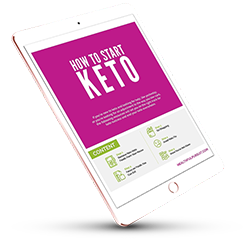I want...
The Ketogenic Diet And Women’s Hormones
August 23, 2018 By
Leanne Vogel

 October 12, 2018
October 12, 2018
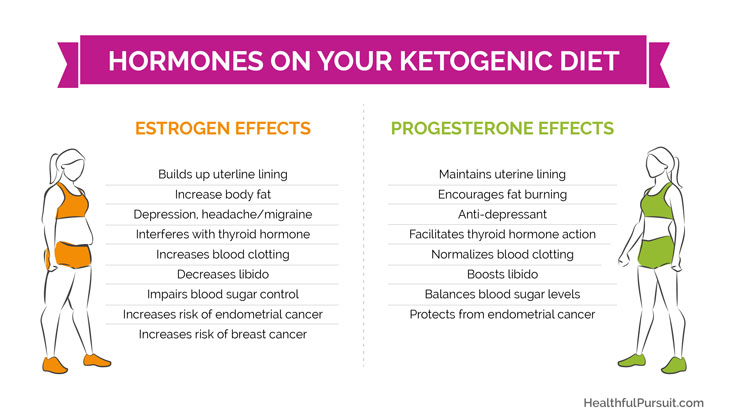
How a woman’s body responds to the ketogenic diet, and adjustments you can make on your low-carb diet to support hormones.
Your body plays a balancing act every single day. It has to know what to do with the food you eat, with the air you breath, and with the chemicals that you put on your body. It is for this reason that when you change your habits, especially your diet, you need to know how it will affect you and more specifically your hormones. In this post I want to dive into how the ketogenic diet will impact your body, down to the details of your hormones on keto, and then I will tell you what you can do to ensure that your hormones remain balanced as a ketogenic woman.
Keto shopping lists, recipes, and more! Start keto with this FREE 5-step guide.
I'm ready!But first, if you were searching the internet for women’s hormone health and just landed here, it’s worthwhile me introducing you to keto so that you’re not thinking, “What is keto”? The whole time you’re reading this article!
Keto is a state the metabolism can reach when we lower our intake of carbohydrates. This can be done in multiple ways which is why the keto diet has become so diverse over the last couple of years. There are so many ways to reach this state, and when we do, we burn fat as energy instead of relying on carbohydrates for our energy.
The Process Is Stressful But The Payoff Is Worth It
In the initial stages of a low-carbohydrate diet, your body will not automatically move into ketosis. Instead, when it can’t find sugar to use as energy it will launch into gluconeogenesis. This is how the process works: When your food doesn’t contain much sugar, your blood sugar levels will dip. In response to this, your body ups its cortisol levels. This is because cortisol is a glucocorticoid hormone. Your adrenal glands release it to make sure you have sufficient energy. When cortisol is released, it stimulates the gluconeogenesis process, which allows the body to convert fat and protein into sugar.
If you follow the keto weight loss method closely, within in a few days your body will move into ketosis. This means that your body will stop using protein for energy and instead burn just fat. It does this when carbohydrates and/or protein are not being consumed for an extended period of time in an effort to maintain glycogen and muscle mass. Unfortunately, during those first few days before your body falls into ketosis you will feel weak, fatigued, and stressed. This stress burden might at first seem bad for your body, but research shows otherwise.
Loving this? Start discovering how powerful the ketogenic diet is for your hormones and overall health with my 30-day guide, Fat Fueled. This step-by-step plan delved deeper into how to use the keto diet to heal your body with extra tips, images, action steps, recipes, and meal plans!
Get the guide for women’s hormones and the ketogenic diet.
One study that looked at the cortisol increases of a ketogenic diet found that the increases were insignificant, whether compared to cortisol levels on a diet with moderate carbohydrate intake or even high-carbohydrate intake. Another concern that has been brought up is the increase in ammonia levels in the body, as ammonia can cause brain and kidney damage. Ammonia is created when the body uses protein for energy, meaning on a ketogenic diet the body would create excess ammonia. Studies have shown that even individuals with a decreased ability to process ammonia can handle a ketogenic diet successfully. Other studies looked at individuals who had been on the keto weight loss plan for less than six months and they could find no kidney damage.
Before moving on from cortisol and stress, I want to provide you with some insight into how cortisol can affect your mineral levels. The stress of carbohydrate restriction does more than just cause the body to release cortisol. It also spurs on the excretion of potassium and limits the release of sodium from cells. This can then add to the fatigue and weakness caused by the gluconeogenesis. It can also lead to constipation. However, it is important for you to know that this mineral and fluid loss cannot be solely blamed on the increase in released cortisol during low-carbohydrate diets.
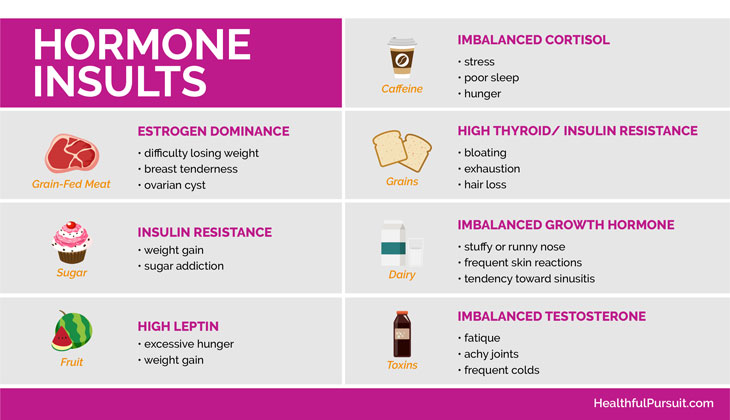
Keto Hormones
The discussion around the ketogenic diet always seems to come back to the diet’s safety in terms of how it affects hormone levels. There are essentially two trains of thought around this topic. On one side, there are proponents saying that the diet helps keto women to better their hormone regulation. On the other side, there are skeptics saying that keto inhibits hormone regulation. To come to an accurate conclusion on this debate, you need to first understand the basics.
Your body is intricate and complex, made even more so by the fact that many factors influence it and push it into a continuously changing state. The different processes that occur in the body need to be regulated. And it is the endocrine glands that help to accomplish this by producing hormones, which essentially act as chemical messengers. Unfortunately, more and more people are struggling to keep these hormones balanced and when hormones are not balanced the body faces myriad health issues. In this article, I have chosen to take a microscope to the following conditions:
- Insulin resistance and uncontrolled blood sugar
- Reproductive and infertility problems
- Thyroid disorders and diseases
- Premenstrual syndrome
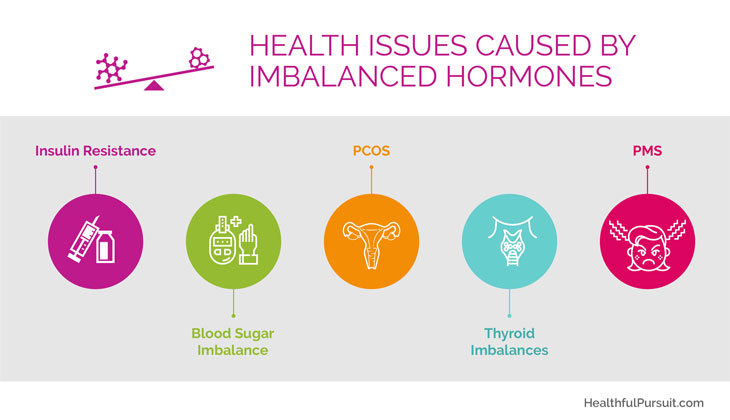
Health Issues That Might Be Created By Hormonal Imbalances
When you listen to a podcast about keto or read an article about the diet the four previously mentioned health conditions are often brought up. The reason for this is that there is research backing the theory that pushing yourself into ketosis can help keto women to treat these conditions, which often stem from hormonal imbalances.
1. Insulin Resistance And Uncontrolled Blood Sugar
To briefly explain insulin: Your pancreas produces insulin when you eat carbohydrates or sugar. The glucose response that is created by this consumption sends a message to the body to release the insulin and send glucose into cells. It is this over-consumption of carbs and the following elevated levels of insulin that is linked to a handful of health-related issues that society currently faces.
Traditionally, this insulin release has been normal. However, in most American diets, which include an overload of carbs and sugar, this release happens too often, leading to blood sugar spike after blood sugar spike and an eventual resistance to insulin. Insulin resistance is becoming more and more rampant and most people only find out that they are suffering from it when more extreme chronic health issues crop up (i.e. type 2 diabetes). The most effective treatment for insulin resistance is prioritizing healthy nutrition and lifestyle decisions, which will then stabilize blood sugar and insulin levels.
And finally for a little good news:
The ketogenic diet is looking like the answer. It is proving to assist with insulin regulation and blood sugar control. More specifically, one area where the ketogenic diet is showing itself useful is in decreasing stress that your body undergoes when your blood sugar spikes and dips. Normally when these blood sugar fluctuations happen cortisol is released—just as it is released whenever your body is put under stress. Since the adrenal glands are responsible for cortisol release, eating carbs can put significant pressure on them. The ketogenic diet undoes this pressure and enables your body to release less cortisol, allowing your adrenal glands to function more effectively. In short, the foods you eat on a ketogenic diet put less strain on the body in comparison to foods that are high in carbohydrates. They also better regulate cortisol metabolism, lending themselves to enhanced hormonal balance.
2. Reproductive And Infertility Problems (PCOS)
Polycystic Ovary Syndrome or PCOS is the main reason for infertility in women. The syndrome develops from poorly balanced reproductive hormones and over 50% of women who are diagnosed are obese or overweight, have symptoms that align with metabolic syndrome, high blood glucose, and insulin resistance.
Currently, PCOS has no cure but it may have a treatment. Many individuals who suffer from PCOS are relying on a ketogenic diet. Because PCOS is tied to poor glucose metabolism, this connection to keto being a possible solution is promising. And studies are starting to show that this treatment is working. Many keto women who had been diagnosed with PCOS prior to starting the diet showed significant improvements in the levels of both insulin and reproductive hormones. Some women in the study even became pregnant, overcoming fertility issues that they had previously been struggling with.
There is also plenty of anecdotal research that has been piling up in support of how women with PCOS can benefit from a ketogenic diet. It all points to an increased quality of life, whether that be through a higher chance of pregnancy or reduced PCOS symptoms.
3. Thyroid Disorders And Diseases
The thyroid gland plays a leading role in hormone regulation. A thyroid that isn’t working effectively can be a big troublemaker. It’s known to cause a long list of disorders and diseases, such has hypothyroidism, Hashimoto’s, and Grave’s. Any criticism of the ketogenic diet in relation to the thyroid is simply incorrect. The diet has been shown time and again to have a very positive effect on thyroid functioning.
It’s best to think about the ketogenic diet’s role in the instance of an autoimmune disease. For those that are suffering from these diseases, they do not try and fix the organ that’s involved (i.e. the thyroid). This is because the disease was not caused by the organ, it was caused by the immune system. Because of this, they concentrate on treating the immune system. And when it comes to treating the immune system, there is no better healer than ketones. On a ketogenic diet, ketones can slowly begin to re-regulate the immune system, which will in turn help the other organs that are involved, rebalancing hormones from the ground up.
And then there’s T3. This is the active thyroid hormone. Evidence shows that when you switch to a ketogenic diet T3 decreases. Some critics suggest that this could cause hypothyroidism. However, the most common cause of T3 decreases on the ketogenic diet is the fact that the body is just able to work more efficiently when it’s in ketosis. Additionally, lower T3 can be good for you because it can help you retain muscle when you are losing weight. This article will give you more insight into keto, the thyroid, and their relationship.
4. Premenstrual Syndrome
PMS affects just about every person on earth—even the men. Women deal with PMS directly and men deal with the women who deal with PMS. I know, that’s kind of a tongue twister, but it is accurate. The symptoms associated with premenstrual syndrome vary. It can include everything from mood swings, brain fog, and acne to depression, fatigue, food cravings, and irritability.
Cue the party music because there’s a proven solution to this dreaded monthly visitor. The ketogenic diet has shown itself to relieve many of the symptoms associated with PMS. But you don’t have to just believe me. You can try it for yourself. Get started with this guide and join other keto women in fighting PMS.
One Last, Very Important Factor
Amino acids/protein, lipids/fat, and cholesterol are the building blocks of every hormone. For example, sex hormones such as testosterone, progesterone, and estrogen rely on good saturated fats and cholesterol. So in order to fuel your body and help it to create the healthiest hormones, as well as efficiently regulate them, you need to eat the best fats and proteins. For this reason it is hard to argue with the fact that a ketogenic diet, which encourages the consumption of healthy fats and proteins, could be bad for your hormones.
Keto Help
- Treat it as a lifestyle, not a diet
- Expect the beginning to be slow
- Practice carb-ups
- Eat plenty of high-quality fat and protein
- Try to reduce any unnecessary stress
In closing, I would like to emphasize the uniqueness of each individual’s body. The needs are different and each body will react to changes in a distinct way. So it’s good to not expect a specific result when you start the ketogenic diet. You might see a few hormonal changes. This is simply your body making adjustments to a new nutritional normal. It is likely not used to relying on fat as the main source of fuel so it will take some time to get used to this change. Be patient and understand that these adjustments, in order to reap the long-term benefits, are necessary. Eventually, if you stay the course with keto, your hormones will begin to regulate. But know that it could take up to several months for them to do so. Having an optimistic and patient mindset, paired with consistency and reliance on the tips that I’ve included above, will help you see amazing results that will guide your body towards balance and healing.
Loved This Keto Content? Share on Pinterest!
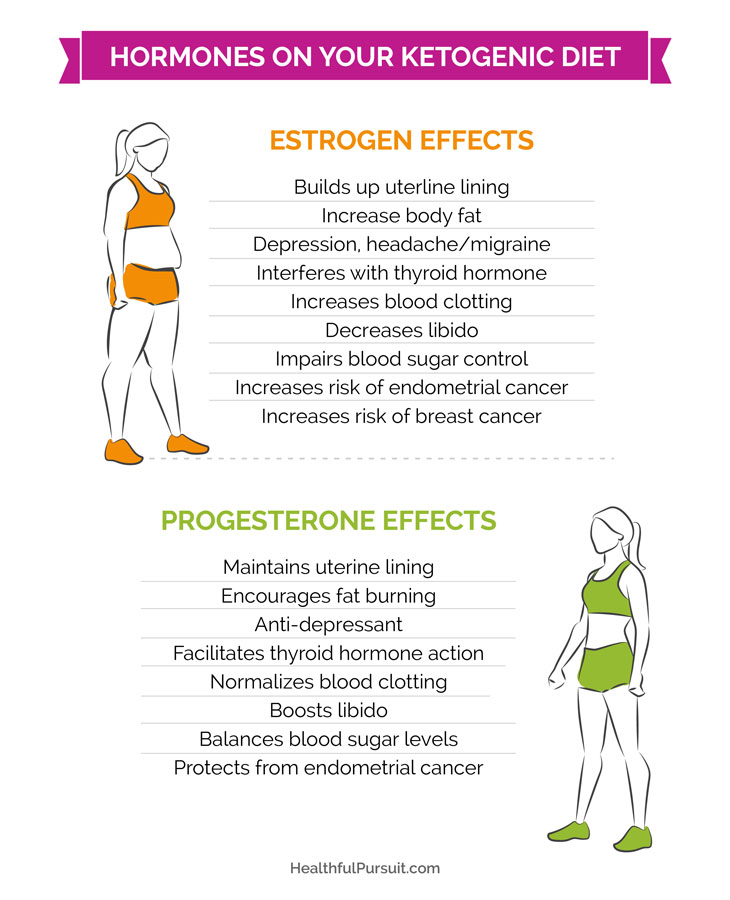
This entry was tagged: carb up, dairy-free keto, eating high-fat, eating keto, eating low-carb, fat-adapted, health, high fat, holistic nutrition, how eat keto, keto, keto basics, keto diet, keto for women, keto life, ketogenic, ketogenic diet, ketogenic for women, ketosis, low-carb, what is keto
Hi! I’m Leanne (RHN FBCS)
a Keto Nutritionist, host of The Keto Diet Podcast, and best-selling author of The Keto Diet & Keto for Women. I want to live in a world where every woman has access to knowledge to better her health.
